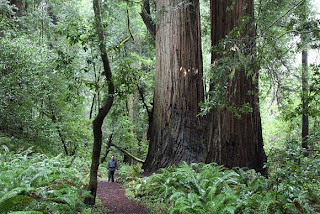
 In Samantha Baker’s blog entry entitled “Don’t Get Too Comfortable – Criticisms of the Reliance on the Picturesque” she writes about Wordsworth’s poem “Lines Left upon a Seat in a Yew-Tree”. The focus of her blog is about how the man who created the seat wrongly gave nature a value based solely on his needs. She explains that the man uses nature to escape the society of men which he can no longer handle and by doing this, is giving nature the value of being a pleasant means to distance himself from that which he finds unpleasant. Samantha argues that by doing this, he has replaced the intrinsic value which nature may have had with his own selfish view of what nature should be. Therefore, he does not find joy or pleasure in nature, but mourns his solitude and emptiness.
In Samantha Baker’s blog entry entitled “Don’t Get Too Comfortable – Criticisms of the Reliance on the Picturesque” she writes about Wordsworth’s poem “Lines Left upon a Seat in a Yew-Tree”. The focus of her blog is about how the man who created the seat wrongly gave nature a value based solely on his needs. She explains that the man uses nature to escape the society of men which he can no longer handle and by doing this, is giving nature the value of being a pleasant means to distance himself from that which he finds unpleasant. Samantha argues that by doing this, he has replaced the intrinsic value which nature may have had with his own selfish view of what nature should be. Therefore, he does not find joy or pleasure in nature, but mourns his solitude and emptiness.I agree with Samantha’s interpretation of the poem and feel that there is also an important symbolism at work that contributes to her argument. I think the act of the man bending the yew-tree into a seat for himself is symbolic of how he bent nature to fit his own purposes of escape and seeking pleasure away from society. Also, the boughs of the tree are said to be “barren” and the speaker also describes the man’s life as “unfruitful” which is another way in which the man’s life is reflected in the nature he is creating around himself. Nature, if left on its own, would not bend the branches that way and it would be a lively fruitful tree. However, this man’s skewed view of nature and his selfish manipulation has turned it into something quite unnatural and lacking natural affect.
In my blog entry, which shares the title of the poem, I interpreted the dashes and breaks in the poem as parts of dialogue which were left out in which the Traveler is showing reluctance to sitting and listening to the Speaker. Perhaps Samantha’s interpretation of the poem gives a little more insight into what the discussion during those dashes may have been about. Perhaps the Speaker was questioning the Traveler about why he was traveling alone, or asking him if he too was escaping something similar to the man in the story. He also may have questioned what he was expecting to gain from seeking out nature or a new place alone. If these had been the questions, we can now understand the Traveler’s reluctance to answer them and why he was avoiding such a conversation.
In the images above, the top picture is of a Bonsai maple tree, which is a miniature tree that is grown and shaped using special pruning and feeding techniques. The bottom picture is of full grown maple trees in a natural forest. This shows the contrast between what exists, and what man tries to re-create. Which do you think is more true to the true nature and value of the trees?

